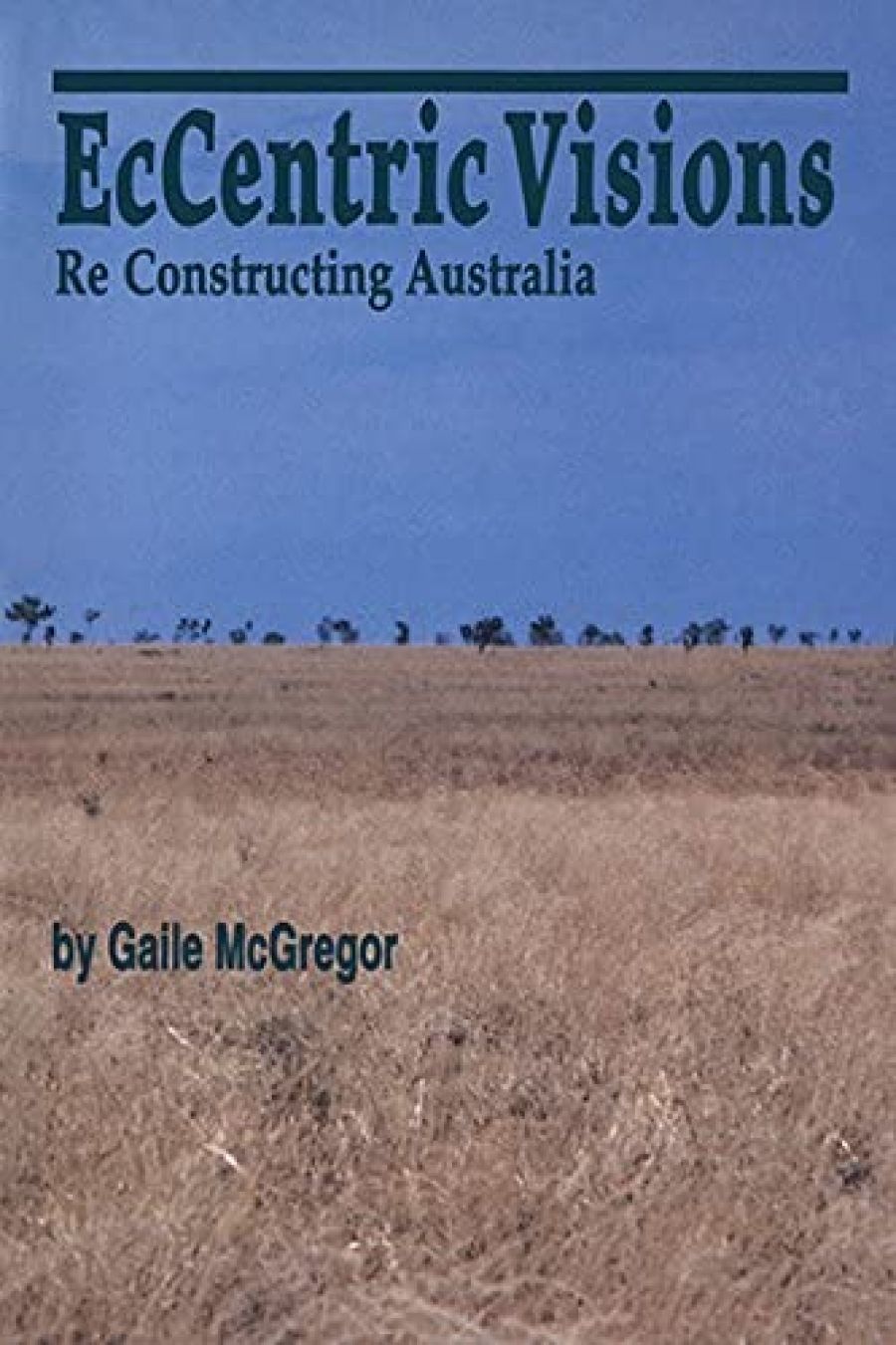
- Free Article: No
- Contents Category: Australian History
- Review Article: Yes
- Article Title: Eccentric indeed
- Online Only: No
- Custom Highlight Text:
Tourism is, I suppose, the quintessential postmodern activity – I’ve been to Bali too. This particular tourist, Gaile McGregor, described as a ‘Canadian itinerant scholar’, offers us EcCentric Visions as part of a trilogy; the previous two titles featured Canada and the United States. The link is, she says, that all three are ‘post-frontier societies’. It’s a definition that depends on whether or not you’ve got past the post.
- Book 1 Title: EcCentric Visions
- Book 1 Subtitle: ReConstructing Australia
- Book 1 Biblio: Wilfrid Laurier University Press
Australian readers who enjoy the Jan Morris genre of travel book should not look here for a bit of escapism. I stress Australian – according to the commendations quoted on the back of the book, at least one North American found it a ‘witty and perceptive travelogue’ as well as a ‘postmodern ethnography in the best sense’.
The perceptions of Gaile McGregor as academic tourist do form a kind of travelogue, commenting on the flora and fauna: ‘the average Australian, as advertised, is extremely friendly’. Such perceptions are accompanied by the analysis of Gaile McGregor as visiting academic, constructing an Australian mythos characterised by ‘endemic ambivalence’.
The physical McGregor dropped into Australia for four months in 1986. This experience was reinforced metaphysically by a stop-over sample of Australian literature. She suggests that her methodology of taking a slice of (white) Australia reveals structured patterns observable as traces or imprints. It is a process akin to turning up a stone and examining what crawls out. McGregor uncovers a pathological Australian condition, stemming from the national failure to live up to a particularly narrow ideology of masculinity. The good news is that the Mad Max series indicated Australians are beginning to discover an ‘effective way of psycho-symbolically “managing” this state of chronic and feminised uncertainty’. The bad news? Australians are ‘handicapped by the lack of any natural talent for intellectual as for other forms of systematic transaction’.
McGregor speculates at one point on the failure of apparently friendly Australian Cultural Studies academics to invite her into their homes.
It may be that, rather than the tendentious and irritating outsider’s picture it first appears, EcCentric Visions is an interesting deconstruction job on the tensions that operate between the outside observer, the continuing life and culture of the observed, and what that culture most publicly offers as itself. Such a reading would complement McGregor’s own preferred description of the book as a version of what the contemporary cultural theorist, James Clifford, calls ‘ethnography as serious fiction’.
Victorians are familiar with Whelan the wrecker and his avatar in Spring Street. McGregor’s iconoclasm is more than a match for theirs. While it may be fun to watch other people’s houses fall, it’s a different story when the wrecker moves into your garden – or local park. So, I enjoyed her apparently ingenuously gendered reference to Australian Cultural Studies as the ‘new boy on the block’, and her analysis of Bob Hawke’s ‘latent sex role ambivalence’ and its contribution to his electoral appeal. But I was, predictably, less enthusiastic about her explanation of the shortcomings of Australian feminists: ‘The guilt these women feel simply for being feminine continually erodes their sense of purpose. Not to mention their praxis.’ All McGregor’s roads lead to that mythos of ambivalence.
After the wrecker’s ball swings back to centre, can we find some useful bits to salvage? McGregor’s own commentary on the relative absence of Aboriginal and Torres Strait Island people from her travelogue could be read as an implicit indictment of the picture offered of itself by Australian power culture. The tourist can, after all, only see what is represented: this outsider cannot ‘read’ indigenous Australians because the tourist guides provide her with no frame of reference, no point of entry. More explicitly, McGregor’s accompanying analysis reverts to a plainer speech when giving an outsider view of Australia’s human rights profile:
… in a notoriously racist country, … (regardless of) the recent fad or aborigines [sic] … there is absolutely no evidence either in popular culture or in the manifest behaviour of the public at large that attitudes towards the real flesh-and-blood aborigines have changed in any essential way.
The public rhetoric reduced to rubble, we can see the wasteland. On the other hand, how far does that persistent use of lower-case (‘aborigine’) reinforce the idea of white Australia’s imperviousness to language politics, and how far is it symptomatic of the writer’s lack of self-reflection? The question epitomises the unease between postmodernist practice and politics.
McGregor gives back to anglo-Australia a blank and timorous landscape: an enigmatic space echoing in the bleached grasses and blue sky of the cover. It’s a landscape to which Theory, little magazines, multiculturalism … have made little difference. McGregor is no prophet, but her brief sojourn in our deserts can call up some uncomfortable inner voices as she holds a far from flattering mirror up to (white) Australian nature – that’s if the textual knots don’t make us abandon the book after the first chapter.
In the truly Australian fashion, according to McGregor’s ethnography, I remain in two minds about EcCentric Visions.


Comments powered by CComment